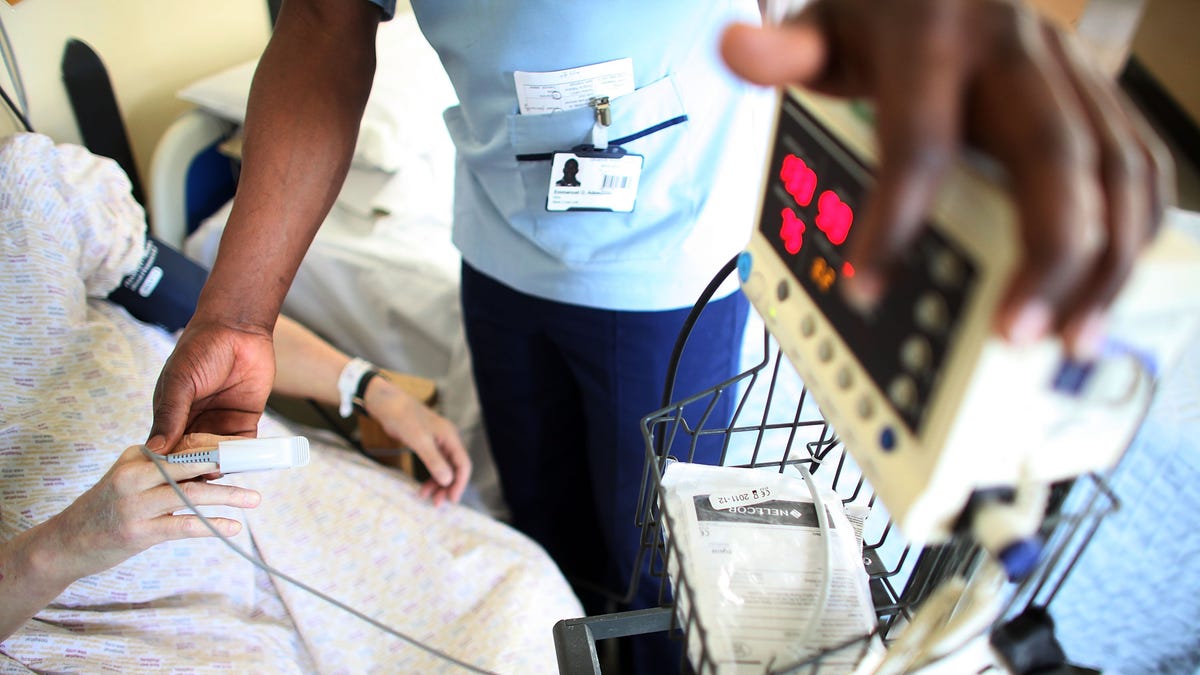
BIRMINGHAM, ENGLAND - MARCH 16: A nurse tends to recovering patients on a general ward at The Queen Elizabeth Hospital on March 16, 2010 in Birmingham, England. As the UK gears up for one of the most hotly contested general elections in recent history it is expected that that the economy, immigration, industry, the NHS and education are likely to form the basis of many of the debates. (Photo by Christopher Furlong/Getty Images) (2010 Getty Images)
Living as an undocumented immigrant in the United States can be very difficult. Struggling as a sick, injured, or chronically ill immigrant can mean days, weeks, or even months of discomfort, with a visit to the emergency room usually the most affordable remedy.
By act of living here illegally, these immigrants have very limited options for health care. All human beings deserve at least a basic level of medical care —to prevent loss of life, deliver a baby, etc.— but does that mean that taxpayers should foot the bill for more extensive care for anyone who manages to cross our borders and establish illegal residence in the US without detection?
We should focus more on sending a strong message to potential immigrants that legal access to government-funded health care should not be an expectation upon arrival in the United States.
In March 2013, the California Endowment, a private foundation that advocates for affordable healthcare, launched a TV ad in which several undocumented immigrants explain to the viewer:
“I’m undocumented…We work hard and we’re strong, but everyone gets sick sometimes. Yet many of us don’t have health care. We cannot get health insurance. Now our country has spoken, saying that everyone should have affordable health care. Does that mean ‘everyone’ everyone? I dream that ‘everyone’ includes all of us.”
It’s unfortunate that part of that ad is untrue. While undocumented immigrants have traditionally had few choices for obtaining health care in the U.S., they can get it legally by purchasing private health insurance, paying out-of-pocket to visit an urgent care or community clinic for routine care or non-life threatening illnesses, or visiting an emergency room.
Urgent care and community clinics have been a primary health care option for undocumented immigrants and many uninsured U.S. citizens for quite some time. While visits aren’t exactly cheap, they’re preferred for low-income families who are generally healthy and can set some money aside for illnesses that require prescription medications, casts for minor bone fractures, etc.
Controversy already exists over the use of emergency rooms for medical care by undocumented immigrants because they know they’ll receive care regardless of their ability to pay for it —which they commonly don’t. Funding for those visits currently comes from federal, state and local taxes, and hospitals in certain cities with high immigrant populations have an expectation for the flow of these patients.
But now that the Affordable Care Act (a.k.a. Obamacare) is set to go into effect in 2014, the public cry from immigrant advocacy groups is growing to allow undocumented immigrants to apply for health care coverage under the Act. Section 1312 (f)(3) of the law: “Access limited to lawful residents. If an individual is not…a citizen or national of the United States or an alien lawfully present in the United States, the individual shall not be treated as a qualified individual and may not be covered under a qualified health plan...”
Under President Obama’s current health care reform plan, undocumented immigrants will have to wait eight years before becoming eligible for public health care benefits, and ten years under a Congressional plan.
We’re in a time when the need for immigration reform has never been more real and our country and government never more ready. However, we’re also in the time of sequestration cuts, shrinking budgets, smaller incomes and higher taxes. Have we created the expectation among undocumented immigrants that by virtue of simply living in the U.S. they should have access to the same government benefits as legal residents, despite the fact that many of them don’t pay the taxes that fund those programs?
Obamacare isn’t free, and undocumented immigrants meeting a certain income threshold would have to pay premiums for any part of the plan they’re eligible for. However, currently the law provides federal subsidies for low-income families applying for public health insurance. According to a 2012 study by the Washington-based Urban Institute, undocumented immigrants —many of whom would require a federal subsidy— will make up the nation’s second-largest population of uninsured, or about 25 percent. All those subsidies would come from U.S. taxpayer pockets.
This isn’t about being anti-immigrant; it’s about following the rules, and not being rewarded for breaking them. My family emigrated from Cuba to the U.S. 50 years ago with nothing but the clothes on their backs, and no expectations or demands of the U.S. government. They worked very hard, followed the rules, and eventually became U.S. citizens. It’s hard for them and other immigrant families like them to watch millions of people who knowingly broke the rules demand equal footing just because they didn’t get caught coming here.
There’s no question that the current health care situation in the U.S. isn’t ideal for undocumented immigrants, but it’s not supposed to be. It’s already difficult enough to make routine health care accessible and manageable for U.S. citizens and legal residents, who must take priority over those living here illegally.
Instead of relying on immigration reform to find a way to pay for undocumented immigrants’ health care with tax dollars, we should focus more on sending a strong message to potential immigrants that legal access to government-funded health care should not be an expectation upon arrival in the United States.
